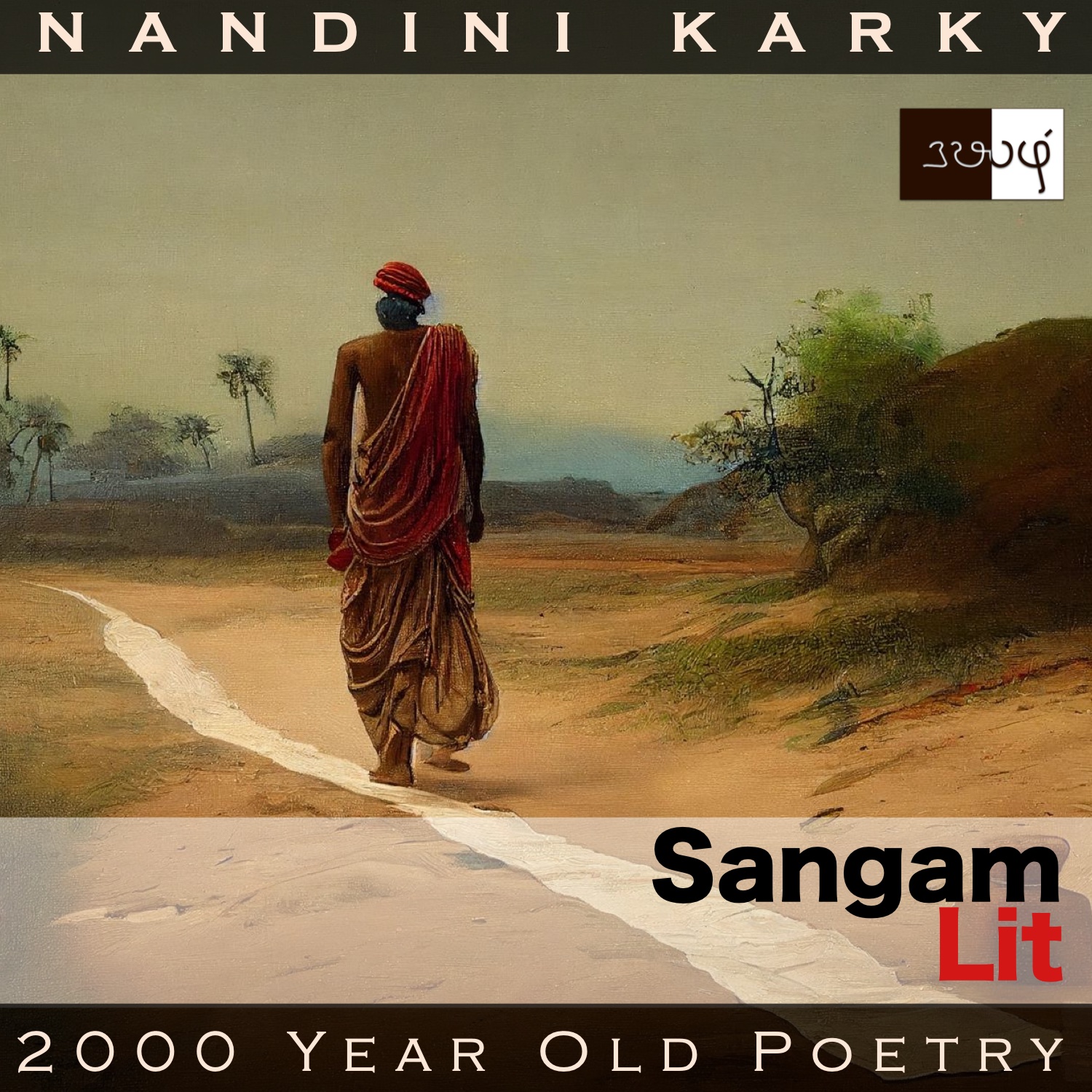Podcast: Play in new window | Download
Subscribe: Apple Podcasts | Spotify | Amazon Music | Android | iHeartRadio | Email | TuneIn | RSS | More

In this episode, we perceive a poet’s strong support for those of his kind, as portrayed in Sangam Literary work, Puranaanooru 47, sung to the Chozha King Nedunkilli by the poet Kovoor Kizhaar. Set in the category of ‘Vanji Thinai’ or ‘king’s prowess’, the verse sketches the life and values of a Sangam poet.
வள்ளியோர்ப் படர்ந்து, புள்ளின் போகி,
‘நெடிய’ என்னாது சுரம் பல கடந்து
வடியா நாவின் வல்லாங்குப் பாடி,
பெற்றது மகிழ்ந்து, சுற்றம் அருத்தி,
ஓம்பாது உண்டு, கூம்பாது வீசி,
வரிசைக்கு வருந்தும் இப் பரிசில் வாழ்க்கை
பிறர்க்குத் தீது அறிந்தன்றோ? இன்றே; திறப்பட
நண்ணார் நாண, அண்ணாந்து ஏகி,
ஆங்கு இனிது ஒழுகின் அல்லது, ஓங்கு புகழ்
மண் ஆள் செல்வம் எய்திய
நும் ஓரன்ன செம்மலும் உடைத்தே.
Another verse sung to Chozha king Nedunkilli by Kovoor Kizhaar. There’s an intriguing context behind this song. This Chozha king seems to have thought that a poet by the name of Ilanthaththan, who had come to his court was a spy, acting on the orders of another Chozha king Nalankilli and decides to put that poet to death. It’s at this time that the poet Kovoor Kizhaar sings this verse to dissuade the king from his decision to kill that poet. Curious how when some atrocious act is about to be committed by a king, the first thought that rises is ‘Someone go get Kovoor Kizhaar’ and this poet is summoned to make the king come to his senses. The words of this poet can be translated as follows:
“Akin to birds soaring high, they radiate towards those with wealth, and not thinking that it’s faraway, traverse many drylands. With their imperfect tongues, they sing according to their skill, rejoice for what’s given, and share with their kin, eat without saving, and grant without hoarding. Does this life of a supplicant that suffers in need know how to do wrong to others? No! With their talents, they only put rivals to shame and walk with their heads held high. And so, such sweet lives of theirs is the same as that of kings like you, O esteemed ruler with fame and wealth to rule over the land!”
Let us now delve deeper into the poet’s argument! He starts by comparing poets to birds and says just like how those winged creatures soar in search of food, so do these poets journey towards the wealthy. And those of wealth may be living at great distances and yet these poets never think, ‘Oh, it’s too long a journey’. Instead they cross those distances through many dryland paths, and then, with their not-so-perfect tongues sing whatever they can. A moment to reflect on this modest statement about a poet’s talent, for the poet is talking about people like him and perhaps does not want to sound proud and arrogant about their abilities.
Returning to the verse, the poet continues in his portrait of the poets as people who are simply grateful for what they get, and whatever they get, they share with their kith and kin. They do not have the habit of hoarding these gifts, rather they spend it all out like a flower that closes not its buds but blooms without reservation. He points out that this pitiable life of the poets knows not how to do wrong to others. The maximum limit they would touch in a conflict is to put a rival poet to shame, purely because of their skill. Other than that, they know not how to hurt anyone, the poet stresses. He finally concludes that because such is their good value system, their life too is as great as that of rulers like this Chozha king!
In a nutshell, the poet clearly states that it’s impossible for the other poet to be a spy as thought by the king, for that other poet does not have it in him to be devious and commit evil to others. Heartening to see the pride of the poet in the values his kind upholds such as gratitude for what life gives them, sharing with others and living a meritorious life. True inspiration in that declaration no matter how wealthy or famous the king may be, even a penniless poet has a life as great as that of that monarch. A shout out from across the centuries that it’s not your possession or designation that is going to define who you are but only what you stand for!




Share your thoughts...